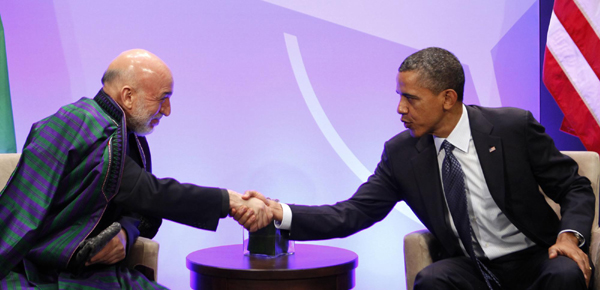US open to complete troop removal after 2014
Updated: 2013-01-09 10:18
(Agencies)
|
|||||||||||
WASHINGTON - The Obama administration does not rule out a complete withdrawal of US troops from Afghanistan after 2014, the White House said on Tuesday, just days before President Barack Obama is due to meet Afghan President Hamid Karzai.
The comments by US Deputy National Security Adviser Ben Rhodes were the clearest signal yet that, despite initial recommendations by the top military commander in Afghanistan to keep as many as 15,000 troops in the country, Obama could opt to remove everyone, as happened in Iraq in 2011.
 |
|
US President Barack Obama (R) shakes hands with Afghan President Hamid Karzai at the NATO Summit at McCormick Place in Chicago, in this May 20, 2012 file photo. [Photo/Agencies] |
Asked about consideration of a so-called zero-option once the NATO combat mission ends at the end of 2014, Rhodes said: "That would be an option that we would consider."
Rhodes made clear that a decision on post-2014 troop levels is not expected for months and will be made based on two US security objectives in Afghanistan - denying a safe haven to al Qaeda and ensuring Afghan forces are trained and equipped so that they, and not foreign forces, can secure the nation.
"There are, of course, many different ways of accomplishing those objectives, some of which might involve US troops, some of which might not," Rhodes said, briefing reporters to preview Karzai's visit.
In Iraq, Obama decided to pull out all US forces after failing in negotiations with the Iraqi government to secure immunity for any US troops who would remain behind.
The Obama administration is also insisting on immunity for any US troops that remain in Afghanistan, and that unsettled question will figure in this week's talks between Obama and Karzai and their aides.
"As we know from our Iraq experience, if there are no authorities granted by the sovereign state, then there's no room for a follow-on US military mission," said Douglas Lute, special assistant to Obama for Afghanistan and Pakistan.
Jeffrey Dressler, an Afghanistan expert at the Washington-based Institute for the Study of War who favors keeping a larger presence in Afghanistan, questioned whether the White House comments might be part of a US bargaining strategy with Kabul.
"I can't tell that they're doing that as a negotiating position ... or if it is a no-kidding option," Dressler said. "If you ask me, I don't see how zero troops is in the national security interest of the United States."
Related Stories
Obama to host Afghan president at White House 2013-01-08 11:12
US elections have little impact on Afghan policy 2012-11-05 11:30
US to transfer key prison to Afghan govt 2012-09-10 10:19
Today's Top News
President Xi confident in recovery from quake
H7N9 update: 104 cases, 21 deaths
Telecom workers restore links
Coal mine blast kills 18 in Jilin
Intl scholarship puts China on the map
More bird flu patients discharged
Gold loses sheen, but still a safe bet
US 'turns blind eye to human rights'
Hot Topics
Lunar probe , China growth forecasts, Emission rules get tougher, China seen through 'colored lens', International board,
Editor's Picks

|

|

|

|

|

|





